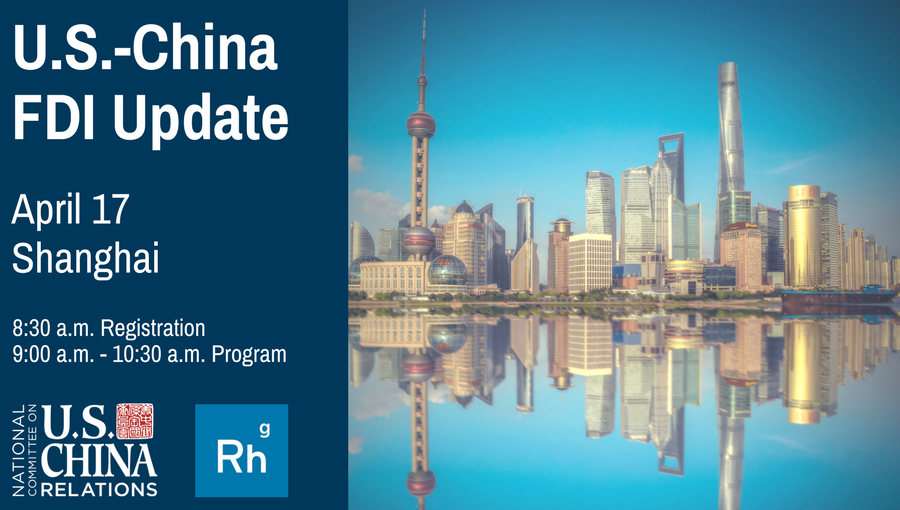Tuesday, April 17, 2018 | 8:00 AM EDT - 10:00 AM EDT
Le Royal Meridien Shanghai |, Shanghai
After reaching a record $60 billion in 2016, foreign direct investment (FDI) flows between the United States and China have been squeezed into a diminished position by forces on both sides of the Pacific. In 2017, Chinese FDI in the United States dropped by more than one-third as Beijing re-imposed capital controls and Washington toughened screening of high-technology acquisitions; the value of newly announced transactions dropped by more than 90%. The outlook for 2018 is more uncertain still. President Trump has designated China a strategic competitor, a label not applied since 2000, and Washington is contemplating a disruptive array of more restrictive China policies to respond to national security concerns and the perceived lack of reciprocity, including greatly intensifying the investment screening process.
On April 17, 2018, the National Committee and Rhodium Group hosted the China launch of a study that will shape the public debate on these urgent topics: Two-Way Street, the definitive analysis of U.S.-China FDI trends from 1990 through 2017. With 12 months of brand new data and a number of recent policy developments in both countries, the report’s authors provided a thorough and timely presentation of research on U.S.-China FDI, followed by a panel discussion with business leaders.
This program is part of the U.S.-China FDI Project, a multi-year research initiative that aims to provide greater transparency on FDI flows between the United States and China, led by the National Committee on U.S.-China Relations and Rhodium Group, in partnership with AmCham Shanghai.

Thilo Hanemann
Report author Thilo Hanemann is director of Rhodium Group’s cross-border investment practice. His research assesses new trends in global trade and capital flows, related policy developments, and the political and commercial dynamics of specific transactions. Mr. Hanemann’s most recent work focuses on the evolution of China’s international investment position, and the economic and policy implications of this new trend. He is a frequent speaker and commentator on China’s outward investment and has published numerous reports and articles on the topic. He is also a senior policy fellow at the Mercator Institute for China Studies, Europe’s biggest China think tank, located in Berlin.

Stephen A. Orlins
Stephen A. Orlins has been president of the National Committee since 2005. Prior to that, he was the managing director of Carlyle Asia and the chairman of the board of Taiwan Broadband Communications, one of Taiwan’s largest cable television and high speed internet providers. Prior to joining Carlyle, Mr. Orlins was a senior advisor to AEA Investors Inc., a New York-based leveraged buyout firm, with responsibility for AEA’s business activities throughout Asia. From 1983 to 1991, Mr. Orlins was with the investment banking firm of Lehman Brothers where he was a managing director from 1985 to 1991. From 1987 to 1990, he served as president of Lehman Brothers Asia. From 1976 to 1979, Mr. Orlins served in the Office of the Legal Advisor of the United States Department of State, first in the Office of the Assistant Legal Advisor for Political-Military Affairs and then for East Asian and Pacific Affairs. While in that office, he was a member of the legal team that helped establish diplomatic relations with the People’s Republic of China. Mr. Orlins is a magna cum laude graduate of Harvard College and earned his law degree at Harvard Law School. He speaks Mandarin Chinese and is a member of the Council on Foreign Relations.

Daniel H. Rosen
Report author Daniel H. Rosen is a founding partner of Rhodium Group and leads the firm’s work on China. Mr. Rosen has more than two decades of experience analyzing China’s economy, corporate sector and U.S.-China economic and commercial relations. He is affiliated with a number of American think tanks focused on international economics, and is an adjunct associate professor at Columbia University. From 2000–2001, Mr. Rosen was senior adviser for international economic policy at the White House National Economic Council and National Security Council. He is a member of the Council on Foreign Relations, and board member of the National Committee on U.S.-China Relations.

Stephen M. Shafer
Stephen M. Shafer has been president of 3M Greater China Area since October 2016, responsible for the leadership and management of all businesses of 3M’s largest overseas market, 3M Greater China Area, which includes mainland China, Hong Kong and Taiwan. He held several other roles at 3M before coming to China, including vice president of 3M Business Transformation, strategic marketing director of Safety and Security, and business director of Packaging Systems and Global Tapes and Adhesives. Prior to 3M, Shafer was associate principal at McKinsey & Company, a top global consulting firm, from 2002 to 2010, counseling top executives on commercial optimization, strategy and performance improvement initiatives. Between 1997 and 2002, Shafer worked at Ford Motor Company and made outstanding achievements in driving profit growth, cost reduction and effective logistic management for the company. Prior to that, he was an engineer at the National Aeronautics and Space Administration, supporting various aeronautics projects. Shafer holds a BS in industrial engineering from Northwestern University and an MBA from Harvard Business School.
